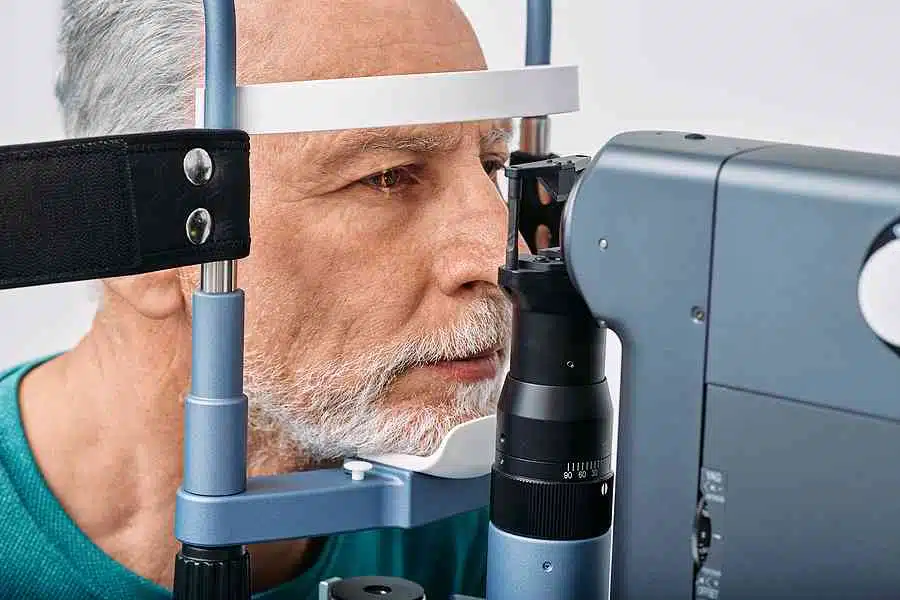Say No To Eye Problems! 5 Top Tips for the Over 50s

Getting older means getting wiser, and that’s something to celebrate.
Yet it also means that your body might not be as robust as it once was. And this includes your eyes.
According to National Geographic, your senses change as you age, and nearly everyone over 55 needs at least partial vision correction.
Once you hit a certain benchmark, you’ll likely start encountering more visual issues—which is why knowing how to take care of your eyes is essential.
The following is an overview of five eye problems you may experience after 50 and how you can best avoid them.
Macular Degeneration
The macula is the light-sensitive tissue of your retina that controls your sharp, central vision. Age can cause the macula to deteriorate over time, a condition called age-related macular degeneration (AMD). It’s the leading cause of vision loss for people 50 and older.
Of its two types, dry AMD is far more common. It happens when your macula gradually becomes thinner with age and small clumps of the protein drusen start growing.
It progresses in three stages—early, intermediate, and late—and occurs over the course of several years. Meanwhile, wet AMD occurs rapidly when blood vessels grow behind the eye and harm the macula.
While there is no treatment for AMD, you can take steps to slow it down.

As part of the retina damage caused by prolonged sun exposure, prescription sunglasses can help if you’re over 50 and experience refractive errors.
Purchasing a pair from online retailer Glasses Direct allows you to leverage features like returns, warranties, and buy-one-get-one-free discounts.
More specific types of the condition, like wet AMD, can be prevented by maintaining healthy blood pressure.
Presbyopia
As you age, your eyes’ lenses harden and become less flexible, disrupting how light focuses on your retina and blurring nearby objects.
If you notice at one point that you have to hold your phone or book away from you to see it better, you most likely have presbyopia—a refractive error that makes it difficult to see up close, and that affects 90% of adults 45 or older.
The bad news is that presbyopia can’t be reversed. The good news is that the condition stops worsening by itself around age 65.
In addition, you have several ways to correct your vision. For many people, over-the-counter reading glasses work well. Once your doctor tells you what strength your glasses require, you can go to a drugstore and determine which glasses are right for you by testing your boosted eyesight on a magazine.
You may even go as far as to consider laser eye surgery..
Those who have more vision problems, though, may need multifocal lenses or progressive glasses to correct their presbyopia.
Retinal Detachment
Retinal detachment is when your retina separates from the back of your eye. Its most flagrant symptom is a sudden spike of floaters—squiggly lines or dark spots that dart across your vision.
Once you observe this with your eyesight, it’s crucial to head to the emergency room right away to ensure that more of your retina doesn’t detach.
Retinal detachment is caused by age, but you’re particularly at risk if your eyes have been interfered with recently via surgery or eye injury.
To help prevent it, enact precautions like wearing safety goggles or similar protective eye gear when playing sports or doing other physical activities.
This will reduce the chances of things hitting your eyes so your retinas stay in place.
Diabetic Retinopathy
If you have diabetes, you may be at risk of diabetic retinopathy—when sugar blocks the blood vessels entering your retina, making those blood vessels leak.
The condition first manifests as trouble seeing far-away objects.
Later on, however, the blood vessels may start bleeding into your eye’s vitreous body, and you’ll see dark, floating spots.
Half of people with diabetes will develop diabetic retinopathy, and the risk increases as you age. However, you can lower your risk by controlling your diabetes.
As we note in our article about over fifties health, part of that is getting your blood sugar levels tested at least once every three years to monitor your health.
Additionally, ensure you exercise regularly and eat healthy to keep your insulin under control.
Dry Eye
Dry eye happens when your tears fail to function correctly, either because your lacrimal gland doesn’t produce enough moisture or your eyes’ meibomian glands produce oil too thick to combine with your tears.
Testosterone is also one of the key regulators of meibomian glands. As you age, your hormone production levels shift and can cause dry eye.
Another factor is if you live in an environment that continually exposes you to smoke or wind, which can damage your tear film.
Avoid those settings and use artificial tears if you want to be proactive in preventing dry eye.
Eye problems begin to heighten once you reach 50. However, you can avoid and control many of them with proper precautionary measures.





